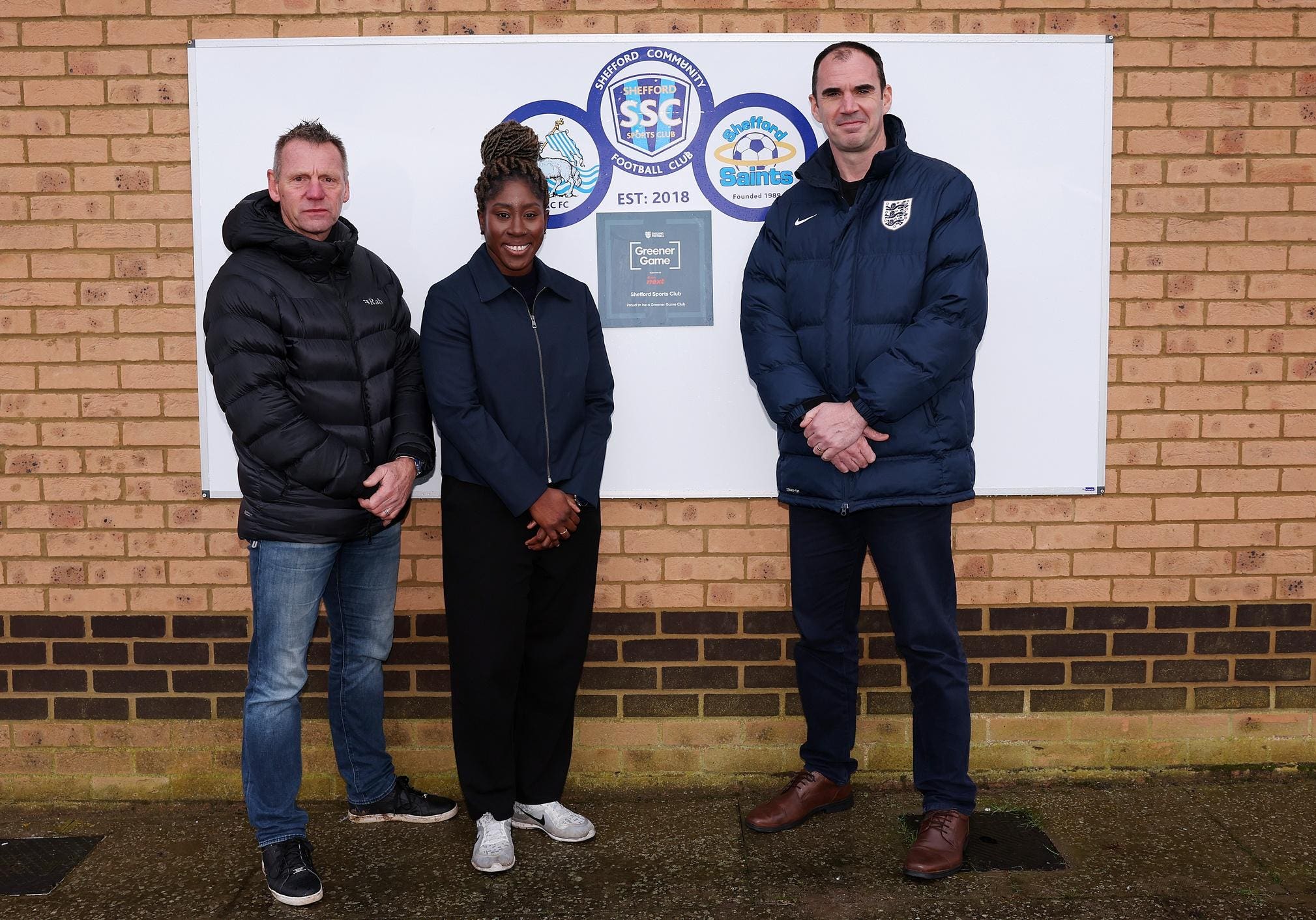
The English Football Association has launched a new sustainability program called the Greener Game. The initiative is a partnership with energy supplier E.ON Next to support grassroots soccer clubs across England to become more sustainable and energy efficient. The Greener Game is a five-year program that will see £1.5 million invested annually, helping between 75 and 100 clubs make sustainable energy improvements each year.
The program, which is free of charge to all FA 3-Star Accredited non-professional clubs, will provide all participating clubs with face-to-face energy audits carried out by E.ON Next staff, and free access to energy-saving and environmental sustainability guides. Clubs can easily register online and will instantly receive energy-saving tutorials, case studies, and guides.
After clubs submit their information online and their energy audits are completed, E.ON Next will provide them with sustainability evaluations and recommendations to improve their environmental sustainability and reduce their energy costs. Investment funds will then be provided for those clubs that require the installation of new technology, like solar panels or heat pumps. Speaking to me on the day of Greener Game’s launch, Phil Woodward, the FA’s Head of Clubs and Facilities said, “as long as an element of infrastructure is required, and the building is in good enough condition then we would look to support it.”
At the time of launch, the FA and E.ON Next said they expect to carry out roughly 200 energy audits annually during the five-year program. However, this is just the beginning. Woodward expressed his desire to see the program grow over time.
For the past several months, the Greener Game has been piloted at four community clubs, including Shefford Town and Crampton F.C., where the official launch of the program was held on November 19. According to the FA’s data, the pilot clubs have already seen a reduction of up to 25% in electricity costs thanks to the introduction of solar and battery energy solutions. The FA expects the installations carried out by E.ON Next at the pilot clubs to help those clubs save “an average of around £3,000 per year, per club, depending on their energy usage.”
Speaking about the FA’s newest sustainability project, James Kendall, The FA’s Director of Football Development, said: “Launching our new Greener Game programme marks another significant milestone for grassroots football and sustainability. Our partnership with E.ON Next allows us to give grassroots clubs practical tools and knowledge to embrace energy-efficient practices that will not only improve their operations and benefit the environment, but will also enable them to save money.
Kendall added, “This new programme is a true reflection of our commitment to creating a sustainable future for the sport we love. We have already seen the fantastic progress made by our Greener Game pilot clubs, and we can’t wait to see how we can support even more across the country through this programme.”
According to Woodward, the Greener Game is a response to English community soccer clubs’ major pain points, which include access to fields, proper facilities, and increasing energy costs. The U.K. has been in a cost-of-living crisis since 2022, and community clubs are hurting. This program will help address clubs’ financial woes by lowering their energy costs and providing them with the tools necessary to adopt other sustainability best practices.
Speaking to me from the Shefford Town locker room on the day of the Greener Game launch event, former England player Stuart Pearce said “every club” is suffering from rising energy costs and climate change. He noted that “as prices go up it has a direct impact on clubs,” adding that he is happy to support “any initiative that will help them save money.”
SHEFFORD, ENGLAND – NOVEMBER 12: Stuart Pearce during the Greener Game Media Launch at Shefford … [+]
Before becoming a top Premier League and English National Team player, Pearce played 250 games for his local amateur club. His days in the lower league gave him an appreciation for the community game, which he recognizes as the lifeblood of the storied English professional soccer pyramid. He is happy in the ambassadorial role he has held for the community game for the last 5 years, and says “I am acutely aware of everything people have done for me,” noting that he has a need to give back.
Pearce expects the grassroots club game to greatly benefit from the Greener Game program. Not only does he see sustainability and a greener environment as a positive for soccer, the country, and the entire world, but he also has a keen sense of how an extra £80-£100 a month can help transform a club. Pearce believes the savings from solar panels, heat pumps or batteries could be spent on facilities for kids, and help deliver a better environment for those who are not even born yet.
Former English Women’s National Team player Anita Asante echoes Pearce’s sentiments on the Greener Game. She says the launch of the project is critical precisely due to the ongoing cost-of-living crisis, adding that it provides “another opportunity to engage with local communities through sport.” Moreover, she feels the added funding will help “ensure young people have access to facilities.”
While community sports are the foundation of all professional sports, they are often forgotten when it comes to funding and passing on expertise. As Asante says “grassroots clubs often rely on individuals who are passionate about the game who don’t always have the right knowledge.” The Greener Game will provide the knowledge base so that community clubs can approach sustainability with the right reference points, and it will add the investment necessary to change club operations for the better.
With the help of the FA and E.ON Next, clubs across England will be able to keep the lights on and the pitches open — at a lower cost — for the next generation of talent that is eager to play the game.
.